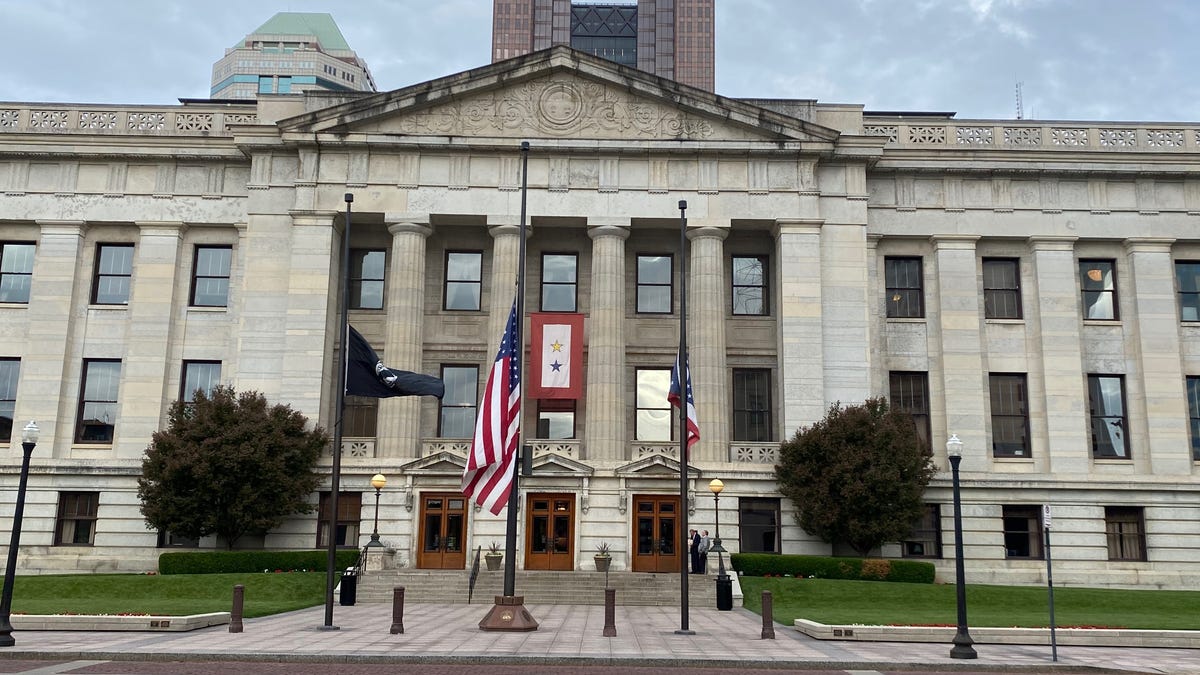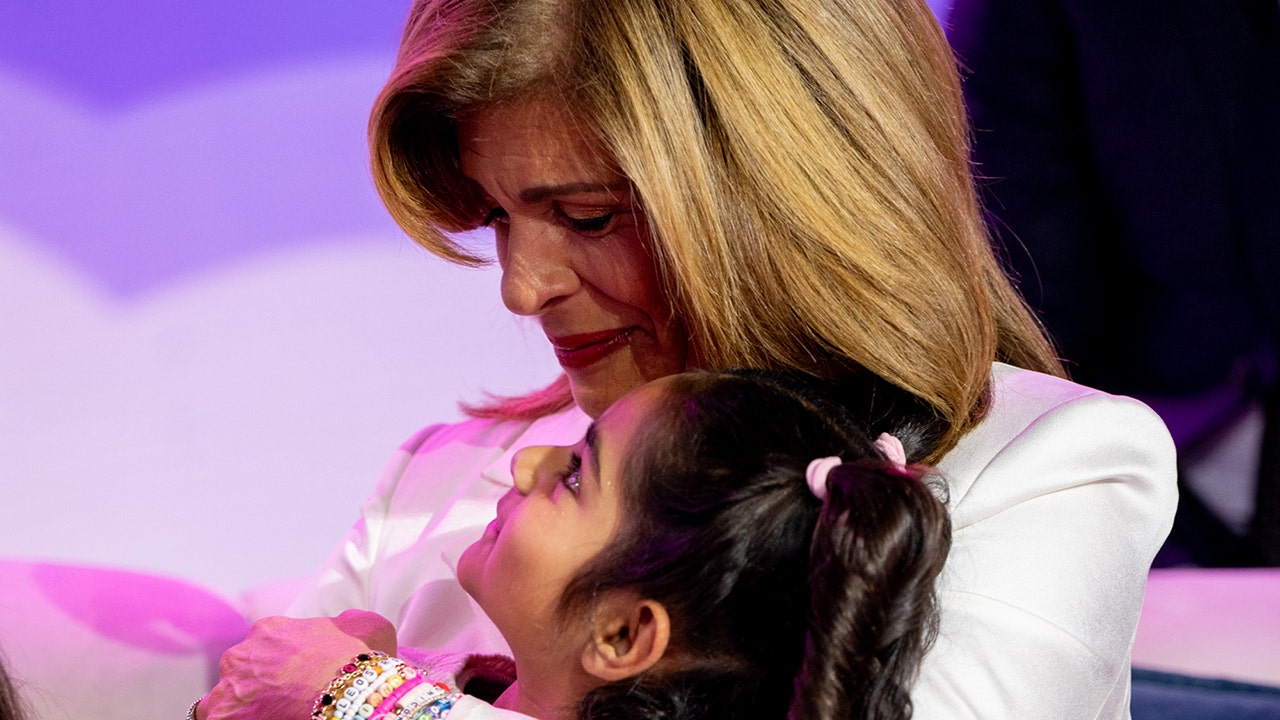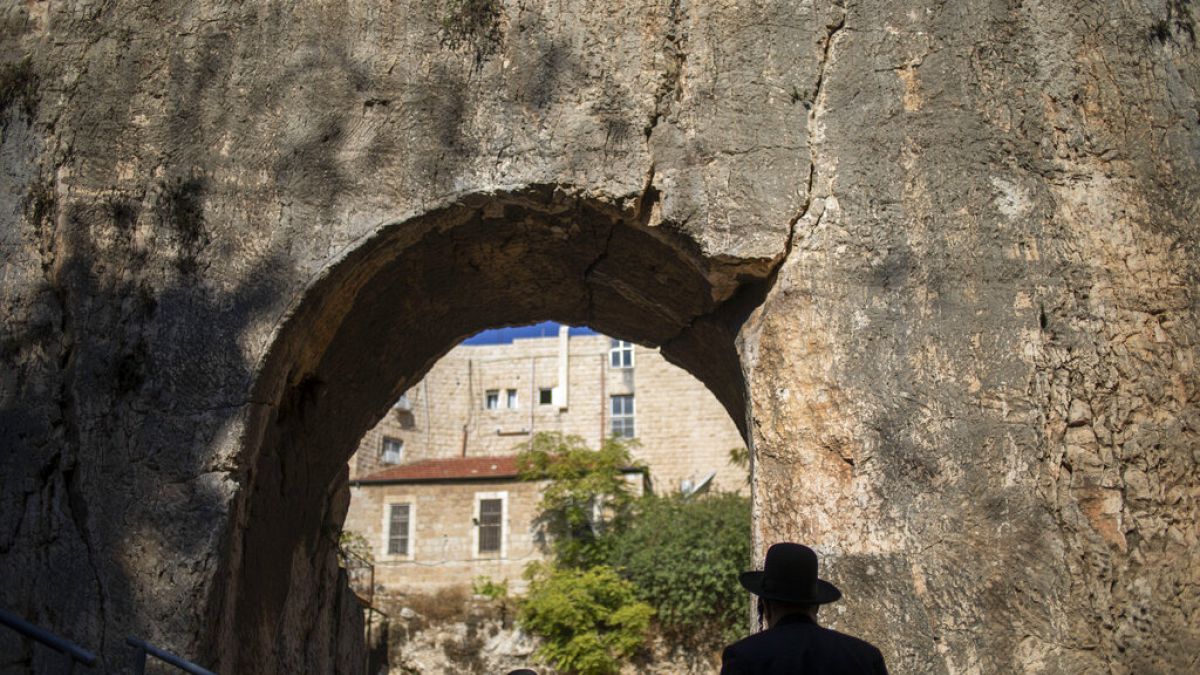World
California store owner fatally shot in dispute over Pride flag; officers kill gunman

CEDAR GLEN, Calif. (AP) — A California business owner was shot and killed after a dispute over a LGBTQ Pride flag displayed outside her store, according to authorities.
San Bernardino County Sheriff’s officials said Laura Ann Carleton, 66, was pronounced dead at the scene of the shooting Friday night.
Sheriff’s officials said that during the initial altercation at Carleton’s clothing store, the suspect “made several disparaging remarks about a rainbow flag that stood outside the store before shooting Carleton.” He then fled the scene.
Deputies were able to locate the armed suspect and he was fatally shot after a confrontation with the officers. The man had not been identified as of Sunday.
Carleton, who preferred to be called “Lauri,” is survived by her husband and nine children in a blended family. She owned and operated the Mag.Pi clothing store in Cedar Glen. The unincorporated community in the San Bernadino Mountains is roughly 60 miles (96 kilometers) east of downtown Los Angeles.
An LGBTQ group in nearby Lake Arrowhead said Carleton didn’t identify as a member of the LGBTQ+ community, but spent time helping and advocating for everyone and was defending her Pride flags placed in front of her shop on the night of the shooting.
Law enforcement agencies in several states have investigated the destruction of rainbow Pride flags as potential hate crimes in recent years.

World
Franklin Graham meets with Zelenskyy in Berlin, offers prayer as Russia-Ukraine war escalates
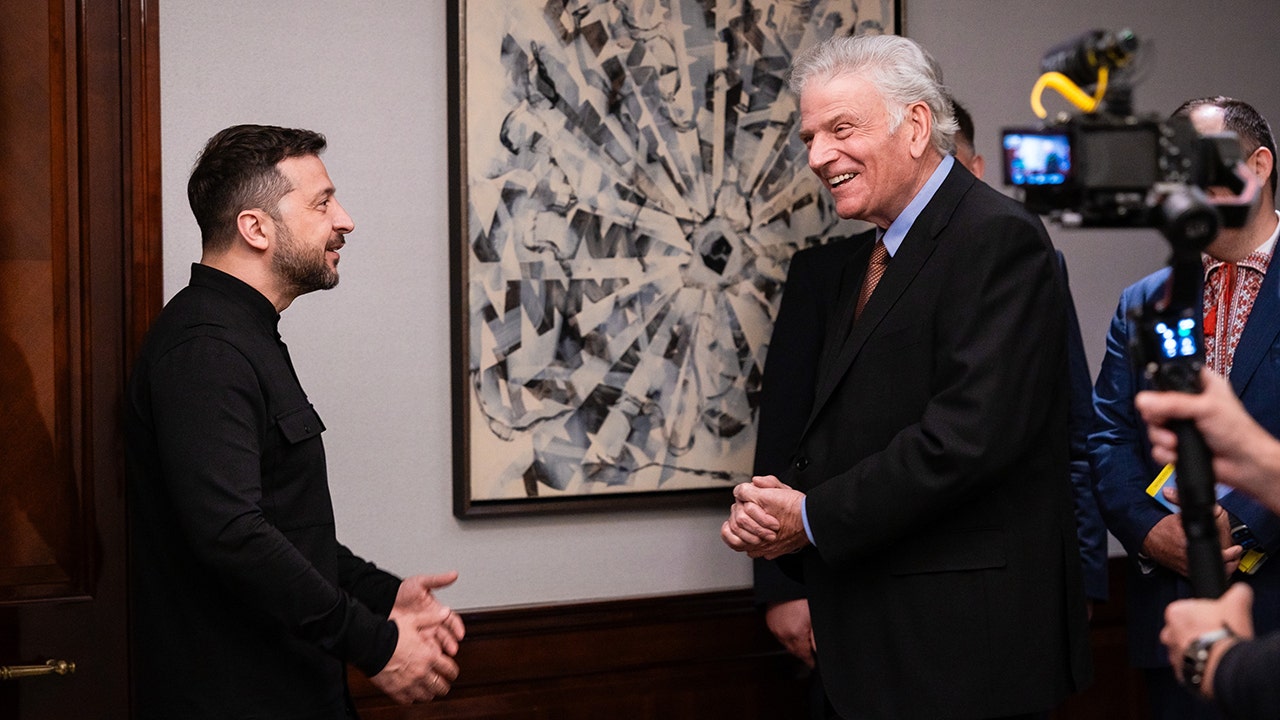
Franklin Graham, president of the Billy Graham Evangelistic Association and Samaritan’s Purse, met Wednesday with Ukrainian President Volodymyr Zelenskyy in Berlin.
During their meeting, Graham offered prayers for Zelenskyy, Russian President Vladimir Putin and President Donald Trump, seeking divine guidance for a path to peace in the ongoing Russia-Ukraine war.
“Today I had the privilege to meet with President Zelenskyy and have prayer with him,” Graham shared on social media. “I prayed for President Putin, I prayed for him [Zelenskyy], and I prayed for President Trump — that God would give them wisdom and that God would give them a path forward for peace.”
ZELENSKY SHEDS DETAILS ON MEETING WITH VANCE, RUBIO IN ROME AFTER RUSSIA PEACE TALKS STALL
Ukrainian President Volodymyr Zelenskyy, left, and Franklin Graham share a conversation during a meeting in Berlin. (Billy Graham Evangelistic Association)
The meeting coincided with the European Congress on Evangelism, where Graham addressed over 1,000 Christian leaders from 55 countries.
He emphasized the complexities of the war, stating, “These are very difficult, and I believe only God can solve this.”
Zelenskyy expressed gratitude for the humanitarian aid provided by Samaritan’s Purse, including support for Ukrainian children, displaced individuals and medical institutions.
“We are very grateful for the strong support from the American people, the White House and President Trump,” Zelenskyy said. “Thank you for your prayers and for helping people.”
The meeting took place against a backdrop of intensified Russian military action in Ukraine.
ON THIRD ANNIVERSARY OF UKRAINE INVASION, EUROPEAN LEADERS SHOW SUPPORT, EXPRESS UNEASE
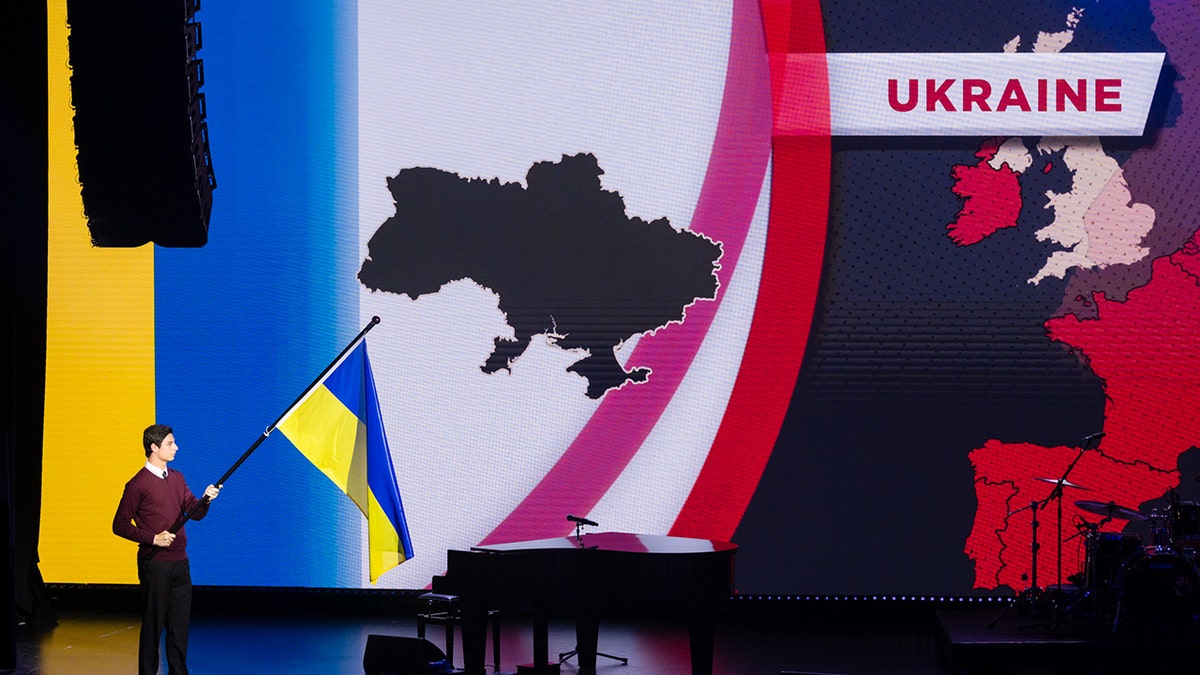
A representative carries the Ukrainian flag during a presentation at the European Congress on Evangelism in Berlin. (Billy Graham Evangelistic Association)
Recent reports indicate escalating Russian air and ground assaults, with increased use of drones by both sides. Germany has announced plans to assist Ukraine in producing long-range missiles, marking a significant deepening of support for Ukraine’s defense industry.
Zelenskyy has proposed a trilateral summit involving Trump and Putin to negotiate an end to the hostilities.
Graham’s visit coincided with the European Congress on Evangelism being held in Berlin for the first time in 25 years.
From Ukraine to the U.K. and Sweden to Spain, over 1,000 pastors and ministry leaders from across Europe have come to the city where Billy Graham once preached to declare that they are “unashamed of the Gospel,” echoing the words of Romans 1:16.
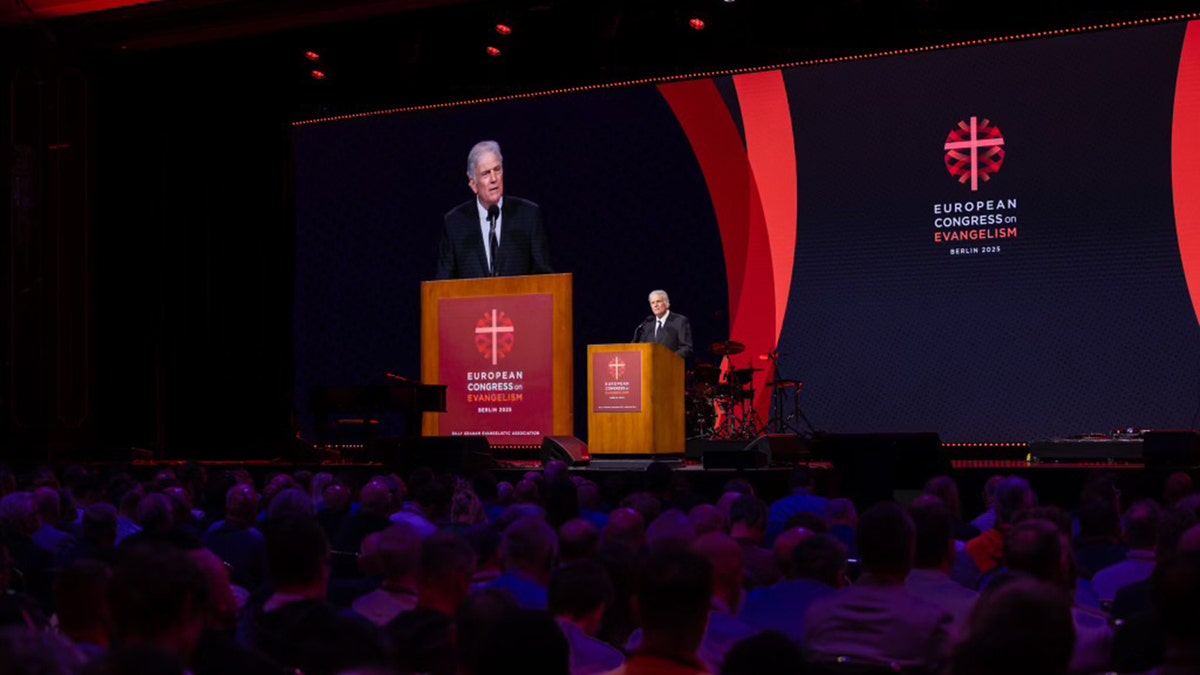
Franklin Graham speaks during the European Congress on Evangelism in Berlin. (Billy Graham Evangelistic Association)
“There hasn’t been a gathering of this kind since the Billy Graham Evangelistic Association’s congress in Amsterdam in 2000,” Graham said. “What a moment for Europe, and what a time to boldly proclaim Christ.”
The congress marks a return to the roots of BGEA’s global evangelistic mission.
In 1966, Billy Graham held the first World Congress on Evangelism in Berlin, declaring the city a platform to reach the world with the message of salvation.
More than 20 speakers from 13 nations are contributing to the 2025 congress, with worship led by Grammy winner Michael W. Smith, Charity Gayle and top Christian artists from across Europe. The event is being translated in 10 languages.
Marc Van de Wouwer, a Belgian evangelist and retired federal investigator, reflected on his experience at the 2000 Amsterdam congress.
“At the time, there were very few evangelists in Belgium,” he said. “That event reignited my passion, and now I’m coming back to help invest in the next generation.”
World
US judge says effort to deport Mahmoud Khalil likely unconstitutional

A United States federal judge has said that an effort by the administration of President Donald Trump to deport pro-Palestine student activist Mahmoud Khalil is likely unconstitutional.
District Judge Michael Farbiarz of New Jersey wrote on Wednesday that the government’s claim that Khalil constituted a threat to US national security and foreign policy was not likely to succeed.
“Would an ordinary person have a sense that he could be removed from the United States because he ‘compromise[d]’ American ‘foreign policy interests’ — that is, because he compromised US relations with other countries — when the Secretary has not determined that his actions impacted US relations with a foreign country?” Farbiarz wrote. “Probably not.”
Farbiarz did not immediately rule on the question of whether Khalil’s First Amendment rights to free speech were violated. He also did not order Khalil’s immediate release, citing unanswered questions about his permanent residency application.
The judge is expected to order further steps in the coming days.
A ruling against the government would be the latest legal setback for the Trump administration’s controversial efforts to crack down on pro-Palestine activism across the US in the name of national security and combating anti-Semitism.
But critics have accused the Trump administration of violating basic constitutional rights in its efforts to do so.
Khalil, a lawful permanent resident of the US, was the first high-profile arrest made in the Trump administration’s push to expel student protesters involved in demonstrations against Israel’s war in Gaza.
A former graduate student, Khalil had served as a spokesperson for the antiwar protests at Columbia University. But on March 8, the 30-year-old was arrested in the hall of his student housing building in New York City, while his wife, Dr Noor Abdalla, filmed the incident.
He was then transferred from a detention centre in New Jersey to one in Jena, Louisiana, while his lawyers struggled to ascertain his location. He remains imprisoned in the Jena facility while the US government seeks his deportation.
In public statements, Khalil has said that his detention is part of an effort to chill dissent over US support for Israel’s war, which has been described as a genocide by human rights groups and United Nations experts.
Civil liberties organisations have also expressed alarm that Khalil’s detention appears premised on his political views, rather than any criminal acts. Khalil has not been charged with any crime.
In Louisiana, Khalil continues to face an immigration court weighing his deportation. But in a separate case before the US federal court in Newark, New Jersey, Khalil’s lawyers are arguing a habeas corpus petition: in other words, a case that argues their client has been unlawfully detained.
US Secretary of State Marco Rubio, acting on behalf of the Trump administration, has cited the Immigration and Nationality Act of 1952 as the legal basis for Khalil’s detention.
That Cold War-era law stipulates that the secretary of state can deport a foreign national if that person is deemed to pose “potentially serious adverse foreign policy consequences”.
But that law has been rarely used and raises concerns about conflicts with the First Amendment of the US Constitution, which guarantees the right to free speech regardless of citizenship.
Judge Farbiarz appeared to echo that concern, warning that the Trump administration’s rationale appeared to meet the standards for “constitutional vagueness”.
That, in turn, means Khalil’s petition is “likely to succeed on the merits of his claim” that the government’s actions were unconstitutional, the judge wrote on Wednesday.
Khalil’s legal team applauded the judge’s order, writing in a statement afterwards, “The district court held what we already knew: Secretary Rubio’s weaponization of immigration law to punish Mahmoud and others like him is likely unconstitutional.”
Khalil is one of several high-profile students whose cases have tested the constitutional bounds of the Trump administration’s actions.
Other international students detained for their involvement in pro-Palestine politics, such as Tufts University student Rumeysa Ozturk and Columbia University student Mohsen Mahdawi, have been released from detention after legal challenges.
But Khalil remains in detention. The government denied a request for Khalil’s temporary release that would have allowed him to witness the birth of his son in April.
It also sought to prevent him from holding his newborn son during visitation sessions at a Louisiana detention centre.
“I am furious at the cruelty and inhumanity of this system that dares to call itself just,” Abdalla, Khalil’s wife, said in a statement.
She noted that Immigration and Customs Enforcement (ICE) had denied the family “this most basic human right” after she flew more than 1,000 miles to visit him in Louisiana with their newborn son.
A judge blocked those efforts by ICE last week, allowing Khalil to hold his son for the first time more than one month after he was born.
World
Live updates: Chaos and gunfire at a new Gaza aid distribution hub leave 1 dead and 48 hurt
Gaza’s Health Ministry said on Wednesday that at least one Palestinian was killed and 48 were wounded when gunshots were fired on a crowd that overran a new aid distribution site in the war-battered enclave that was set up by an Israeli and U.S.-backed foundation.
Chaos erupted as crowds of Palestinians broke through the fences around the distribution site on Tuesday. It was not immediately clear who opened fire, Israeli forces, private contractors or others.
Israel has vowed to seize control of Gaza and fight until Hamas is destroyed or disarmed and exiled, and until the militant group returns the remaining 58 hostages seized in the Oct. 7, 2023, attack that sparked the war.
Hamas-led militants killed some 1,200 people, mostly civilians, and abducted 251 people in the 2023 attack. Israel’s retaliatory offensive has killed around 54,000 Palestinians, according to the Gaza Health Ministry, which does not distinguish between civilians and combatants in its count.
Here’s the latest:
Israel hits the airport in Yemen’s capital held by Iran-backed rebels
Israeli Defense Minister Israel Katz said Wednesday’s strikes destroyed the last plane used by the Houthi rebels, while the rebel-run al-Masirah TV said they had targeted a plane from the country’s flagship carrier Yemenia.
The strikes came after Iran-backed Houthi rebels fired several missiles at Israel in recent days, without causing casualties.
The Houthis have targeted Israel throughout the war in Gaza in solidarity with Palestinians. The Houthi missiles have mostly been intercepted, although some have penetrated Israel’s missile defense systems, causing casualties and damage.
Israel last struck the airport in Sanaa on May 6, destroying the airport’s terminal and leaving its runway riddled with craters. Some flights resumed to Sanaa on May 17.
A controversial new aid distribution system
The distribution hub outside Gaza’s southernmost city of Rafah were chaos erupted on Tuesday was opened by the Gaza Humanitarian Foundation.
The foundation is taking over the handling of desperately needed aid under a new, U.S. and Israeli-backed system despite concerns raised about the group from the United Nations and the recent resignation of its executive director.
The U.N. and other humanitarian organizations have rejected the new system, saying it won’t be able to meet the needs of Gaza’s 2.3 million people and allows Israel to use food as a weapon to control the population. They have also warned of the risk of friction between Israeli troops and people seeking supplies.
Spokesman says the UN has nothing to do with the new aid system
Stephane Dujarric says the United Nations has not nothing to do with the Gaza Humanitarian Foundation’s aid distribution because its plan does not comply with U,N. humanitarian principles of neutrality, independence and impartiality in delivering aid — which apply from Gaza to Sudan to Myanmar and dozens of other countries.
Dujarric said on Tuesday that it is “an arduous process” to coordinate with Israeli authorities to get U.N. trucks to the loading area to pick up aid, and to determine if roads for the trucks to traverse are safe.
“We’re still trying — desperately trying — to deliver aid based on our system that has worked … and it’s very challenging,” he said
-

 News1 week ago
News1 week agoMaps: 3.8-Magnitude Earthquake Strikes Southern California
-

 Politics1 week ago
Politics1 week agoTrump, alongside first lady, to sign bill criminalizing revenge porn and AI deepfakes
-

 Movie Reviews1 week ago
Movie Reviews1 week agoReview | Magellan, conqueror of Philippines, as we’ve never seen him before
-

 Education1 week ago
Education1 week agoHow Usher Writes a Commencement Speech
-

 Politics1 week ago
Politics1 week agoExpert reveals how companies are rebranding 'toxic' DEI policies to skirt Trump-era bans: 'New wrapper'
-

 Culture1 week ago
Culture1 week agoDo You Know the English Novels That Inspired These Movies and TV Shows?
-
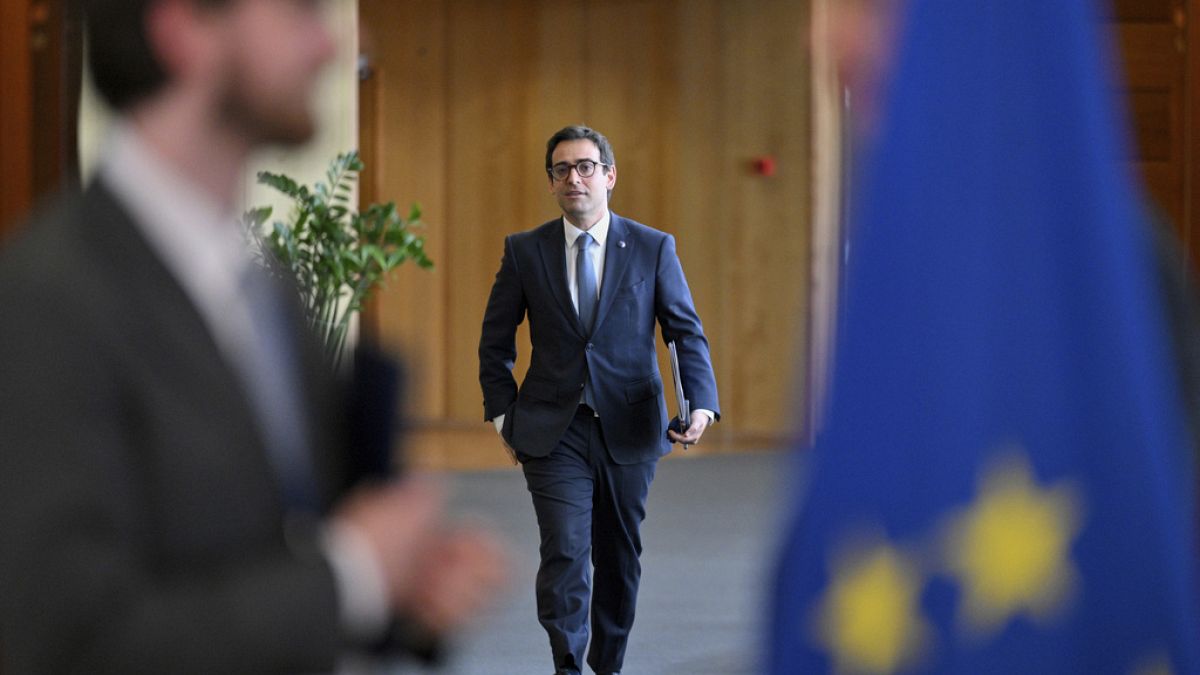
 World1 week ago
World1 week agoDigitisation fronts new Commission strategy to boost EU single market
-

 World1 week ago
World1 week agoEU reaches initial deal to lift economic sanctions on Syria: Reports

